| Pages:
1
..
7
8
9
10
11
..
19 |
kilowatt
Hazard to Others
  
Posts: 322
Registered: 11-10-2007
Location: Montana
Member Is Offline
Mood: nitric
|
|
Do they make ones that are longer than 7"?
The mind cannot decide the truth; it can only find the truth.
|
|
|
hissingnoise
International Hazard
    
Posts: 3940
Registered: 26-12-2002
Member Is Offline
Mood: Pulverulescent!
|
|
You could try running it without cooling, kilowatt, and check for overheating as it goes along.
It should work fine and your long electrodes should dissipate heat pretty well.
7 inch tungstens would seem to be on the short side, but they might work.
Aluminium, though, should stay inert once passified, and dissipates heat just as well as copper.
The real problem, it seems to me is getting enough absorption since the NO2 concentration will be very low.
An improvised absorption tower, though, will need a good compressor to drive it!
But you're most of the way there. . .
|
|
|
kilowatt
Hazard to Others
  
Posts: 322
Registered: 11-10-2007
Location: Montana
Member Is Offline
Mood: nitric
|
|
I have gotten the concentration up pretty high by running it without the air circulation. Perhaps an intermittent absorption would be most efficient.
However for the production itself, a low concentration is more efficient. Good diffusion in the bubbler should help a lot in any case.
Maybe condensing the NO2 with a Peltier cooler would be a better option.
[Edited on 18-3-2009 by kilowatt]
The mind cannot decide the truth; it can only find the truth.
|
|
|
hissingnoise
International Hazard
    
Posts: 3940
Registered: 26-12-2002
Member Is Offline
Mood: Pulverulescent!
|
|
Yes, your immediate problem is the leaking oil-pump, since your set-up will produce HNO3 as it is.
Tweaking efficiency is of minor importance in home-synthesis. . .
Once you solve the leak problem, you might be able to run it continuously and get usable amounts of acid.
|
|
|
muze801
Harmless

Posts: 3
Registered: 11-1-2009
Member Is Offline
Mood: No Mood
|
|
I just attempted a Nitric Acid Synthesis last night with moderate results, using almost all makeshift apparatus.
I used a piece of Al tubing for my condenser, assuming that it would be OK due to passivation.
I added KNO3 to an excess of somewhat concentrated sulfuric acid (boiled down battery acid). After heating, my flask filled with a dark brown/red gas
(NO or NO2?), and I got a nice drip of RFNA distillate in my receiving flask.
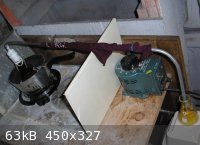 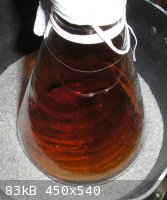 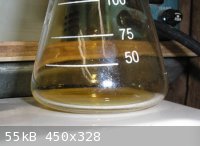
The HNO3 had some precipitate in it, that formed a crystal sheet at the bottom of the beaker, could this be AlNO3 from the tube?
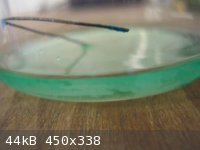 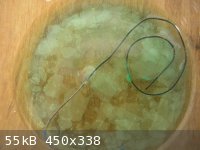
|
|
|
hissingnoise
International Hazard
    
Posts: 3940
Registered: 26-12-2002
Member Is Offline
Mood: Pulverulescent!
|
|
What is the wire composed of and what's it doing in the acid?
I'd be surprised if the contamination came from the aluminium tube (if it was clean), but a proper condenser would be better---if you can afford to
have a variac you can afford more glass. . .
[Edited on 21-4-2009 by hissingnoise]
|
|
|
Picric-A
National Hazard
   
Posts: 796
Registered: 1-5-2008
Location: England
Member Is Offline
Mood: Fuming
|
|
Conc. HNO3 has been stored in aluminium containers as they are so strongly oxidising they are not attacked by nitric acid. Especially at
concentrations of 90% +...
|
|
|
hissingnoise
International Hazard
    
Posts: 3940
Registered: 26-12-2002
Member Is Offline
Mood: Pulverulescent!
|
|
If a layer of Al2O3 is scratched or damaged HNO3 will reoxidise the exposed metal, dislodging the Al2O3 layer in scales, as a new layer forms.
That's what it looks like. . .
|
|
|
Formatik
National Hazard
   
Posts: 927
Registered: 25-3-2008
Member Is Offline
Mood: equilibrium
|
|
NO oxidation
Quote: Originally posted by Formatik  | Since then I've thought of ways to make this go more smoothly but haven't tried anything. I wonder if conc. H2O2 could be used to oxidize NO
efficiently and more readily: 2 NO + 3 H2O2 = 2 HNO3 + 2 H2O
As well as combining with any NO2:
2 NO2 + H2O2 = 2 HNO3 |
There's some corroboration for that idea. Though still no idea on applicability under previously described conditions. NO forms HNO2 with aq. H2O2
solution, but with excess H2O2, HNO3 forms (C.F. Schönbein, J. pr. Ch. 81 [1860] 265), according to: 2 NO + H2O2 = 2 HNO2 and 2 NO + 3 H2O2 = 2 HNO3
+ 2 H2O (G. Lunge, Z. anorg. Ch. 3 [1890] 568). The only way this could be useful is if the combination occurs significantly more rapidly than with
air oxygen. Washing the oxides into NaOH looks simple enough, where nitrate can be eventually recovered. According to Sanfourche in C.r. 175 [1922]
469, a n-NaOH solution converts nitrogen oxides at room temperature into NaNO2 and NaNO3, with the latter dominating even in an absence of oxygen.
Note on HNO3 and Al: Aluminium is still attacked by HNO3, especially hot acid. As described in by Stillman, JACS 19 [1897], 711, for example, 1g of Al turnings, 200cc of HNO3 (d= 1.46) at 100 deg. dissolved aluminium completley within 2hrs. Even at
ambient temp. the Al gets attacked and dissolved by all range of acids (d= 1.15 to 1.46) even if gradually, more rapidly in the lesser concentrated
stuff.
[Edited on 22-4-2009 by Formatik]
|
|
|
hissingnoise
International Hazard
    
Posts: 3940
Registered: 26-12-2002
Member Is Offline
Mood: Pulverulescent!
|
|
N2O5 produced by oxidation of NO2 by ozone should dissolve (readily?) in water, producing (theoretically?) concentrations up to 100% white acid.
Ozonised air from a homemade NST ozoniser should be more than sufficient to oxidise the output from a Jacob's Ladder.
With H2O2 lower concentrations might be expected unless one had access to highly concentrated peroxide.
Thanks for that Formatik, it's useful to know aluminium's weaknesses; presumably Al tanks for HNO3 are pretreated internally to resist corrosion.
Fluorine comes to mind. . .
[Edited on 23-4-2009 by hissingnoise]
|
|
|
DJF90
International Hazard
    
Posts: 2266
Registered: 15-12-2007
Location: At the bench
Member Is Offline
Mood: No Mood
|
|
I think a small percent of HF is added as a corrosion inhibitor for WFNA and/or RFNA. I can't remember where I read this though and have no further
information on the matter.
|
|
|
User
Hazard to Others
  
Posts: 339
Registered: 7-11-2008
Location: Earth
Member Is Offline
Mood: Passionate
|
|
So a parallel system with a ozone generator and a Jacobs ladder, both bubbling and/or circulating through a solution might lead to some rather
interesting results.
Btw has anyone a working ozone generator.
I have 2 NTS's laying here doing nothing.
What a fine day for chemistry this is.
|
|
|
hissingnoise
International Hazard
    
Posts: 3940
Registered: 26-12-2002
Member Is Offline
Mood: Pulverulescent!
|
|
Of course DJF90, I'd forgotten only inhibited acid, IWFNA/IRFNA is transported in Al.
My brain was in first gear. . .
User, here's an idea; in addition to ozone, air-fed ozonisers produce nitric oxides in moist air; if moisture content could be controlled within tight
limits, the Jacob's Ladder could possibly be dispensed with.
A set-up like that, producing N2O5+H2O could run continuously into a cold-trap to condense a HNO3/N2O5 mixture.
Strong white HNO3 on tap would be a kind of holy grail---boiling sulphur with HNO3 producing your H2SO4. . .
You'll easily find info on building HT ozonisers. . .
I cannibalised my NSTs a long time ago. . . dammit!
|
|
|
User
Hazard to Others
  
Posts: 339
Registered: 7-11-2008
Location: Earth
Member Is Offline
Mood: Passionate
|
|
The idea behind the method would be that any nitrous oxides would be oxidized to max. extend. So it just might optimize the yielding of hydrogen
nitrate.
In a nutshell is producing nitrous oxides isn't much different from ozone generators.
But separation of the 2 systems working parallel just might do the trick.
Although i have seen a lot of ozone generators online I am wondering how the ones who have actually build one did it.
What a fine day for chemistry this is.
|
|
|
hissingnoise
International Hazard
    
Posts: 3940
Registered: 26-12-2002
Member Is Offline
Mood: Pulverulescent!
|
|
I haven't tried it (yet) but a simple ozoniser could be improvised from a liebig condenser.
A close-fitting aluminium or SS tube inserted into the vapour-path would serve as one electrode and a wrapping of Al foil, taped around the outside
between the water connections would be the second electrode.
The water connections would serve as air-inlet and ozonised air-outlet.
The tubing used would need to be resistant to ozone.
And just remember you're dealing with potentially lethal voltages and that caution is needed.
The output from the arc-chamber and that from the ozoniser could be led into a large jar or flask where they would mix and react before being led into
water for absorption.
The amber NO2 in the arc-chamber should be oxidised to colourless N2O5 in the reaction flask.
|
|
|
The_Davster
A pnictogen
      
Posts: 2861
Registered: 18-11-2003
Member Is Offline
Mood: .
|
|
Or put a thin tube, and have the vapour path filled with an electrolyte. There is an ozone thread somewhere around here where this was done by a few,
including myself.
|
|
|
Magpie
lab constructor
    
Posts: 5939
Registered: 1-11-2003
Location: USA
Member Is Offline
Mood: Chemistry: the subtle science.
|
|
My grandparents, suffering from arthritis or rheumatism, used to have an ozone generator in their house, circa 1955. All I can remember about the
generator is that it had a number of glass electrical discharge tubes about 1/2" x 1 ft long. Whenever I would visit the place reeked of ozone. 
|
|
|
hissingnoise
International Hazard
    
Posts: 3940
Registered: 26-12-2002
Member Is Offline
Mood: Pulverulescent!
|
|
The_Davster, the electrolytic method, AFAIK, produces less ozone than HV but low voltages are very attractive from a safety standpoint.
The beauty of NO2 oxidation though, is that it might produce acid of any concentration and above (HNO3/N2O5).
And I'm guessing that oxidation of sulphur by HNO3/N2O5 mixtures just might produce oleum.
They're potent nitrating agents that wouldn't need the dehydrating effect of H2SO4 as N2O5, itself, will act in that regard.
Magpie, I know various medicinal claims have been made for ozone-therapy but I didn't know it could treat arthritic conditions.
Still, it's great to walk into a place to be met by the clean smell of ozone---I love it!
|
|
|
Magpie
lab constructor
    
Posts: 5939
Registered: 1-11-2003
Location: USA
Member Is Offline
Mood: Chemistry: the subtle science.
|
|
| Quote: |
Magpie, I know various medicinal claims have been made for ozone-therapy but I didn't know it could treat arthritic conditions.
|
Actually, I think it was just quackery. They seemed to think it helped but I've never seen any official agreement on this.
Listening to the snapping from the electrical discharge and the strong smell of ozone was a bit intmidating to me as a child. I didn't hang around
that machine for very long. 
|
|
|
crazyboy
Hazard to Others
  
Posts: 436
Registered: 31-1-2008
Member Is Offline
Mood: Marginally insane
|
|
Yeah that sounds scary, but I love the smell of ozone...even if it's toxic.
|
|
|
hissingnoise
International Hazard
    
Posts: 3940
Registered: 26-12-2002
Member Is Offline
Mood: Pulverulescent!
|
|
Quote: Originally posted by Magpie  |
Actually, I think it was just quackery. They seemed to think it helped but I've never seen any official agreement on this. |
Negative ions produced by the machine would have a positive effect on mood so there were some definite benefits.
Makes me want to go out and buy an ioniser for just that reason. . .
|
|
|
Formatik
National Hazard
   
Posts: 927
Registered: 25-3-2008
Member Is Offline
Mood: equilibrium
|
|
Don't smell it too much. O3 is extremely aggressive to the lungs. I was doing an ozonation latley outside and didn't really inhale it but could smell
it, and afterwards there was blood in my spit for over a day. Next time I'll always wear the gas mask.
|
|
|
hissingnoise
International Hazard
    
Posts: 3940
Registered: 26-12-2002
Member Is Offline
Mood: Pulverulescent!
|
|
Realistically Formatik, blood in the sputum could just as easily be caused by a minor chest infection but linking it to your ozone exposure is
understandable. . .
Had it persisted, a visit to your doctor would have been advised.
Would a mask give full protection against ozone?
|
|
|
Formatik
National Hazard
   
Posts: 927
Registered: 25-3-2008
Member Is Offline
Mood: equilibrium
|
|
I suspect the appearance of blood was due to lung trauma caused by the ozone. Regardless, I did get treatment. I've done other ozonations and when
wearing the gas mask, and not a trace of ozone could be smelled, so from my experience a gas mask alone offers excellent protection.
|
|
|
hissingnoise
International Hazard
    
Posts: 3940
Registered: 26-12-2002
Member Is Offline
Mood: Pulverulescent!
|
|
Your ozone generator must be an effective piece of kit, Formatik---is it commercial or home-built, and have you ever considered oxidising NO2 or SO2
with it?
|
|
|
| Pages:
1
..
7
8
9
10
11
..
19 |